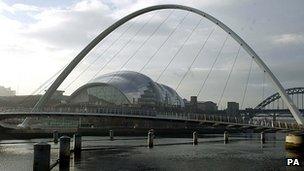Arts face battle to avoid funding 'abyss'
- Published

Ciccarelli's ice cream factory makes tubs for the Newcastle Theatre Royal
Faced with savage budget cuts, Newcastle is the first city to plan to scrap council funding to theatres and other arts venues - and more cities may follow suit. Can arts subsidies be justified when vital services are being reduced?
Inside a utilitarian industrial unit in Cramlington, Northumberland, a fleet of ice cream vans is hibernating for the winter.
In a side room, surrounded by steel vats, two ladies - Stacey and Jade - are filling dozens of small pink and white tubs with "artisan" ice cream.
The contents of these tubs will soon be devoured 10 miles away during the intervals in Newcastle Theatre Royal's pantomime.
Stacey, Jade and their colleagues at the small, family-run Ciccarelli ice cream factory have been sending 2,000 tubs a week to the theatre since winning the contract several months ago.
But the theatre is one of the venues that is likely to lose council funding over the next three years.
The theatre says the council accounts for a relatively small proportion of its income (about 6.5%) and insists it will not close. But the council has said it is "particularly vulnerable". If the theatre was to go, Stacey and Jade would go too.
They are the human face of what is known as the theatre's "economic impact" - the knock-on effect of its activities in the local economy.
According to research, every £1 of public subsidy to cultural venues in Newcastle and neighbouring Gateshead brings £4-£5 back to the economy thanks to increased business at places like bars, restaurants and hotels, as well as ice cream suppliers.
That is one of the key arguments for continuing to fund such venues - if funding was cut, the knock-on impact would cease and, metaphorically-speaking, the city would shoot itself in the foot.
Domenico Gregorio, general manager of Ciccarelli's, says he has let his staff go at the end of the summer in previous years.

Protesters greeted councillors before Newcastle Council's cabinet meeting on Wednesday
"We were closing down for the winter but this opportunity came and I kept four people on and I'm looking to grow the business now," he says.
"The theatre's kept our factory open. It's kept the lights on."
Investment in the arts has also helped Newcastle reinvent itself as a cultural destination since the decline of heavy industry.
The fear is that some of that work may now be undone - although landmark destinations such as the Baltic gallery and Sage concert hall are in Gateshead and not affected by Newcastle's planned cuts.
The venues facing a 100% cut from Newcastle council include Live Theatre, Northern Stage, Tyneside Cinema, Dance City and the Seven Stories children's book centre.
Council funding represents between 4% and 14% of their total turnover. Libraries, galleries and museums are also in line for heavy reductions.
As well as the economic benefits and cultural wellbeing such venues bring, supporters point to their role in nurturing new talent.
Live Theatre gave big breaks to writers including Billy Elliot creator Lee Hall and Tinker Tailor Soldier Spy screenwriter Peter Straughan.
Live's artistic director Max Roberts says: "Some people are born to stand on a stage and perform or write a play for that stage - like some people are born to run in an Olympic race or run a financial institution.
"What's important is we must allow all the people from all the classes access to fulfil their creative ambition. If denied - our society will undoubtedly be poorer for it."
Newcastle Council acknowledges the benefits - but it is, according to its leader, on the brink of the "abyss of austerity", after being asked to save £90m a year.
Arts, museums and libraries are far from the only areas being cut. Before a council cabinet meeting on Wednesday, protestors highlighted reductions to respite care, the youth service and the numbers of looked-after children.
Council leader Nick Forbes has warned that rising costs and falling income mean the council will run out of money for essential services such as social care and refuse collection by 2018 - never mind services like arts, which they have no obligation to fund.
Mr Forbes, who sings in the Northern Sinfonia Choir, says he "gets the argument that investment in culture has led to economic regeneration, jobs and prosperity".

The Sage concert hall in Gateshead has helped the city reinvent itself
But he says: "This is a time for priorities. Not even the most committed member of the cultural sector could argue that arts come before life and death services like children's social work.
"We're about essential services. I know we can all argue about what constitutes essential, but for us it's quite simple. It's the things we must do otherwise people die or suffer terrible abuse that scars them for life. It's not funding a theatre or a cinema."
He adds: "I love the arts, I appreciate what they can do - but I love protecting the vulnerable more."
One council that is convinced of the power of the arts - for now - is Middlesbrough. The £1m of annual council funding to the five-year-old Middlesbrough Institute of Modern Art (Mima) has proved controversial at a time when the council has to save £14m.
But Mayor Ray Mallon says the town centre is the "engine room" of Middlesbrough and the gallery has a "key role to play".
He says: "The gallery is not only a beacon of the town's aspiration and ambition, helping to change perceptions of Middlesbrough, but it contributes to the economic regeneration of the town, attracting investment and people to Middlesbrough, and supporting the development and growth of the creative industries."
'Bleak' outlook
Newcastle's plans, which are open to public consultation, come after Somerset Council cut 100% of its arts funding two years ago. There are now fears across the country that more will follow suit.
The Local Government Association, which represents councils, predicts that the costs of social care and waste services will rise over the next eight years as council income declines - leaving little money for anything else.
"Without reform, the outlook is increasingly bleak," says Cllr Flick Rea, chair of the LGA's culture, tourism and sport board.
"Britain's ageing population means the cost of providing adult social care is rising out of control. Until that's addressed, funding for every other service, including arts funding, is under threat."
It seems likely that Newcastle will not be the last authority to sacrifice the arts in an attempt to squeeze between a particularly big rock and a very hard place.
- Published28 November 2012
- Published21 November 2012
- Published20 November 2012
- Published15 November 2012
- Published13 November 2012
- Published27 June 2012